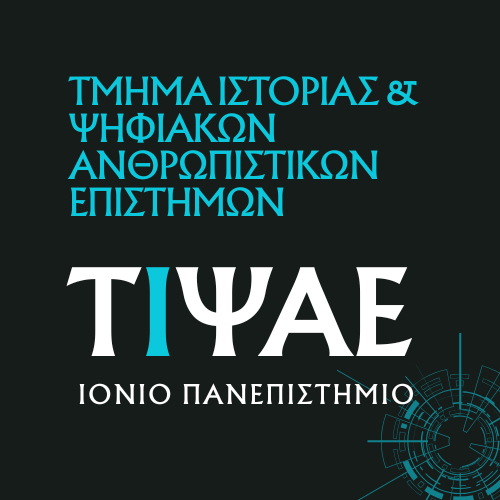DIGITAL DIASPORAS
Teaching Staff: Damilakou Maria
Course Code: ΨΑΕ602
Course Type: Seminar
Course Level: Undergraduate
Course Language: Greek
Delivery method: Lectures
Semester: 6th
ECTS: 5
E Class Page: https://opencourses.ionio.gr/courses/DHI432/
Curricula: Curriculum in History up to 2024-25, Curriculum in History and Digital Humanities from 2025
The dominance of digitality in the modern era not only offers new tools and resources for the study of the phenomenon of diaspora/migration but also brings significant changes to the way diasporic communities are formed, to their characteristics, and to their identities. The various forms of digital expression, communication, and networking reshape the perception of space and borders, strengthen the transnational dimension and cultural hybridity of migrant/diasporic communities, and create new types of relationships, ties, and exchanges between the sending country and the host society. In this context, diasporic communities, through the participatory practices that characterize modern digital communication and social networking media, shape their own narratives and their own public memory, which find diverse forms of expression and representation.
The first part of the seminar examines how modern digital tools and resources (databases, search platforms, digital museum collections) enrich our knowledge of the phenomenon of diaspora and facilitate related research. The second part, through the study of certain digital media concerning Greek diasporic communities in North America (USA and Canada), focuses on the relationship between digitality and diaspora and explores the identity, cultural landscapes, and memory of specific diasporic communities.
Upon successful completion of the course, the student will:
- Understand key aspects of human mobility as well as the meanings of concepts such as diaspora and transnational communities.
- Be familiar with the use of new digital tools and resources for studying the phenomenon of diaspora/migration.
- Recognize how the dominance of digitality today has brought about significant changes in the way diasporic communities are formed.
Be familiar with concepts such as transnationalism and hybridity of migrant/diasporic communities and understand how modern forms of digital communication and networking alter perceptions of space and borders and influence the formation of diasporic identities.
Week 1: Introductory lecture on key concepts and terms related to human mobility: migration flows, diaspora, refugee flows, transnational diasporic communities.
Week 2: The map of the contemporary global diaspora. Historical context and typology of the most important migration flows, 19th–21st century. Familiarization with contemporary interactive maps depicting the global diaspora. Presentation of the group project: creation of a website for Greek diasporic communities.
Week 3: Modern digital tools for the study of diaspora: databases, migrant search platforms, digital genealogical records. Presentation of tools and their practical applications.
Week 4: Modern digital tools for the study of diaspora. Group exercises with specific tools such as the Ellis Island database and search platform.
Week 5: Modern digital tools for the study of diaspora. Digitized oral and written migrant testimonies.
Week 6: Digital archival collections of Greek diasporic communities in the USA.
Week 7: Digital museums on Greek migration to the USA and Canada. Presentation and virtual visit.
Week 8: Digital museums on Greek migration. Analysis of oral testimonies of migrants.
Week 9: Digital museums on Greek migration. Narrative and public memory.
Week 10: Digital communication media, blogs, and websites related to Greek-American communities in the USA. Presentation and analysis of specific media. Student project presentations.
Week 11: Digital communication media, blogs, and websites related to Greek diasporic communities in the USA and other host countries. Content and language analysis. Individual student presentations.
Week 12: Digital communication media, blogs, and websites related to Greek diasporic communities in the USA and other host countries. Student project presentations.
Week 13: Discussion on the group project: creation of a website for Greek diasporic communities.
Robin Cohen, Παγκόσμια διασπορά, Αθήνα, Παπαζήση, 2003.
Λ. Βεντούρα, Δ. Καρύδας, Γ. Κουζέλης (επιμ.), Σύνορα/Όρια, Αθήνα, Νήσος, 2017.
Γιώργος Καλογεράς, Εθνοτικές γεωγραφίες. Κοινωνικο-πολιτισμικές ταυτίσεις μιας μετανάστευσης, Αθήνα, Κατάρτι, 2007.
Γιώργος Αναγνώστου, Χαρτογραφήσεις της λευκής εθνοτικότητας. Λαϊκή εθνογραφία και δημιουργία χρηστικών παρελθόντων στον ελληνοαμερικανικό κόσμο, μτφρ. Π. Μαρκέτου, Αθήνα, Νήσος, 2021.
Ergon. Greek/American Arts and Letters (https://ergon.scienzine.com/).
- Weekly in-person lectures presenting and discussing the topics outlined in the syllabus.
- Collective project on the theme: “Designing a website for Greek diasporic communities.”
- Weekly tasks on the course chat in Open eClass.
- Oral presentations of student projects.
Students learn to use various modern digital tools and resources (databases, digital maps, search platforms, digital museum collections) to study diasporic communities. In addition, they work with modern digital communication media, blogs, and websites and participate in a collective project on the theme “Designing a website for Greek diasporic communities.” At the same time, extensive use of the e-Class platform is made as a means of communication and assessment.
Student assessment is based on three criteria (in addition to attendance and participation in class):
- Their participation in the group project concerning the design of a website for Greek diasporic communities.
- Their performance in short weekly tasks assigned to the whole group.
- Their oral presentation of a project involving the study of a digital medium (news outlet, social networking platform, blog, website) from the Greek diasporic communities.
Back



